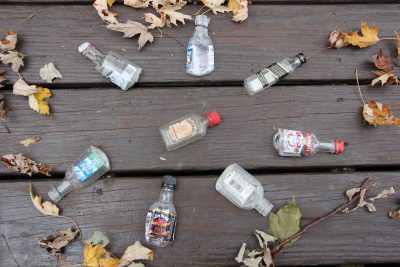
This op-ed article by CTSG Communications Coordinator Judy Benson was published in Connecticut Hearst newspapers on Nov. 6, 2021 and The Connecticut Mirror on Nov. 12, 2021.
Nips cost a little more in Connecticut these days.
The price of those single-serving plastic liquor bottles that end up on roadsides, sidewalks and beside park benches most everywhere went up five cents on Oct. 1. That extra nickel isn’t likely to have a major impact on sales of these 1.5-ounce shots of whiskey, vodka and other spirits, which sell for about 99 cents to $1.50, depending on the brand.
Still, it might make a dent in the litter problem, because the five-cent tax is earmarked to help cities and towns reduce waste and litter. But perhaps more importantly, this action is another public acknowledgment that the proliferation of plastic waste is a problem needing attention.
As a member of the group developing a Marine Debris Action Plan for Long Island Sound led by the Connecticut and New York Sea Grant programs, this small step gives me hope. It means that the comprehensive strategy being developed by Sea Grant and more than two dozen partner groups for tackling the trash harming one of our most precious natural resources can tap into growing public consensus. While it’s still coming together, the plan already identifies plastics and other consumer debris as one of the main focus areas.
That’s because it’s not just a nuisance and an eyesore. As “Pollution to Solution: A Global Assessment of Marine Litter and Plastic Pollution” a new United Nations report points out, it’s a problem of global consequence for humans and wildlife, particularly as it impacts the ocean environment that sustains the planet.
“Plastics are the largest, most harmful and most persistent fraction of marine litter, accounting for at least 85 percent of total marine waste,” the report states.
About 80 percent of the 75 to 199 million tons of plastic now in the ocean ended up there after being discarded on land, so that’s where efforts are most needed to turn off the faucet.
“The amount of plastic in the ocean is projected to nearly triple by 2040, putting human health and the health of the world ocean and seas at risk, and creating a plastisphere,” a new type of marine ecosystem, lead report author Jacqueline McGlade said in an Oct. 21 webinar. She is one of dozens of scientists who contributed to the report over the last two years.
“It has lethal and sublethal effects, when plastics are ingested by the smallest worms to the largest whales,” she said. “It can hurt the role of carbon sequestration by corals, seagrass and mangroves. And when plastics break down, they transfer toxins into the food chain.
“At every single scale plastics are affecting us,” she said.
They are also making a significant contribution to greenhouse gas emissions fueling climate change, reducing the ocean’s ability to absorb excess carbon from the atmosphere. They are damaging the mental health of people on island nations with beaches degraded by plastic litter, McGlade said.
A case in point are the Caribbean islands of Antigua and Barbuda, where Walter Webson is the U.N. ambassador. He talked about the “multiplier impact” that plastics have on his nation, degrading the fragile ecosystem and damaging the social viability and food security of island residents.
He was asked whether the world could act fast enough.
“It’s not a matter of can, it’s a matter of must,” he said. “This is a threat to the economic and social well-being of developing countries.”
He and McGlade are among those sounding the call for a global agreement to radically change the way the world produces and consumes plastic. That means the linear single-use model would be replaced by a circular one where truly biodegradable and recyclable materials are used and reused. Labeling and recycling programs would improve dramatically, and producers would be held responsible for the entire life cycle of their products.
“A single strategy won’t work,” McGlade said.
Clearly, this is a global challenge on par with — and connected to — the daunting task of taking on climate change that has summoned world leaders to Glasgow, since plastics are made from the byproducts of the same fossil fuels causing rising seas and temperatures. The combination of plastic pollution and greenhouse gases pose a compounding threat to the Earth.
But just like climate change, plastics also aren’t a problem that should be left to the world leaders alone to solve. Local and individual actions matter. That’s why the Marine Debris Action Plan for Long Island Sound is being created. And it’s why we’ll need everyone’s help for it to succeed.
For information on the Marine Debris Action Plan for Long Island Sound, send an email to CT Sea Grant Associate Director Nancy Balcom at: Nancy.balcom@uconn.edu.
The United Nations Environmental Program report can be found at: https://www.unep.org/resources/pollution-solution-global-assessment-marine-litter-and-plastic-pollution#:~:text=The%20assessment%20examines%20the%20magnitude,ecosystems%20from%20source%20to%20sea.
Judy Benson is the communications coordinator for Connecticut Sea Grant, based at the University of Connecticut’s Avery Point campus in Groton.